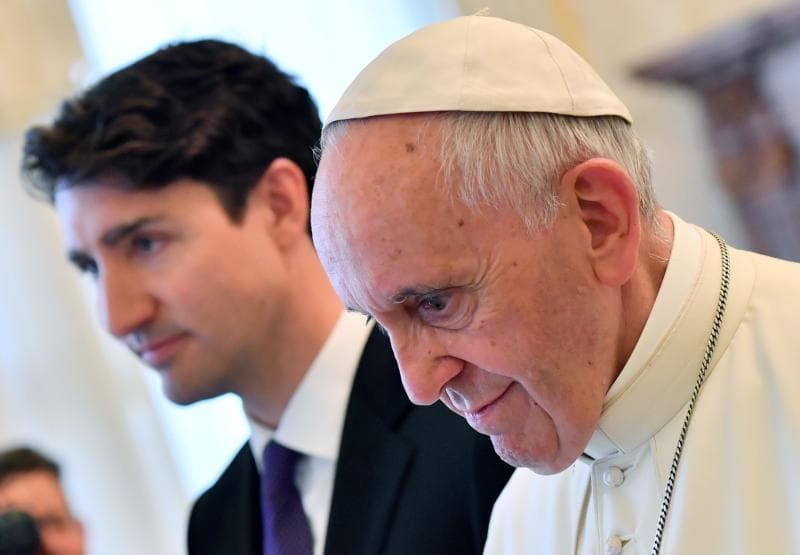Pope Francis will not personally apologize to Canada’s indigenous population for mistreatment at Catholic-run institutions, according to the president of the country’s bishops’ conference.
Canadian Prime Minister Justin Trudeau said he personally invited the pontiff to make the apology during a meeting at the Vatican last May.
In the late 19th century, the Canadian government established a program to remove children from Canada’s indigenous population – called the First Nations – and send them to residential schools, most of which were run by religious institutions, including the Catholic Church.
(Several other religious organizations, including the Anglican and Presbyterian churches, also ran residential schools.)
The purpose was to ‘assimilate’ the children to mainstream Canadian society. Over 150,000 were removed from their families in the century-long program and many abuses were recorded at the institutions. At least 6,000 children died while resident in the system.
Canada established a Truth and Reconciliation Commission about the schools in 2008, which issued a list of recommendations in 2015. One of the recommendations was that the pontiff come to Canada to personally apologize for the mistreatment.
“I told him [Pope Francis] how important it is for Canadians to move forward on real reconciliation with the indigenous peoples and I highlighted how he could help by issuing an apology,” Trudeau told reporters after the May 29, 2017, meeting.
Bishop Lionel Gendron of Saint-Jean-Longueil, the president of the Canadian Conference of Catholic Bishops, wrote a letter to the First Nations on March 27 saying the Canadian bishops have been in dialogue with the pope and the Vatican “concerning the legacy of suffering” experienced by Canada’s indigenous population.
“The Holy Father is aware of the findings of the Truth and Reconciliation Commission, which he takes seriously. As far as Call to Action #58 [the request for a papal apology] is concerned, after carefully considering the request and extensive dialogue with the Bishops of Canada, he felt that he could not personally respond,” the letter said.
“At the same time, sharing your pain, he has encouraged the Bishops to continue to engage in an intensive pastoral work of reconciliation, healing and solidarity with the Indigenous Peoples and to collaborate in concrete projects aimed at improving the condition of the First Peoples,” Gendron continued.
The bishop said if Francis ever visits Canada, a meeting with indigenous peoples would be a “top priority.”
“Pope Francis, in fulfilling his mission as Universal Pastor, has spoken often and passionately about the plight of Indigenous peoples around the world and the wisdom they offer, not shying away from acknowledging those injustices that have failed to conform to the Gospel and expressing regret for past wrongs. He has pointed to Indigenous Peoples as critical dialogue partners to whom the Church needs to listen,” Gendron wrote.
“For our part, through the participation of Catholic Bishops and faithful in the [Truth and Reconciliation Commission] process and from our ongoing relations with Indigenous Peoples, we have heard your invitation to engage honestly and courageously with the past, to acknowledge the failings of members of the Catholic Church, and to take active steps of solidarity with Indigenous Peoples towards a better future,” the letter continued. “To this, with the strong encouragement of Pope Francis, we pledge our commitment.”
Gendron pledged to work for reconciliation through concrete pastoral initiatives and authentic encounters with the First Nations communities.
“All of these ongoing conversations and actions – and many more that need to be initiated – are vital to reconciliation and the vision of a future full of hope. In the near future, we Bishops wish to share with you what we are learning from our encounters, and with you, to take further steps towards reconciliation,” the bishop wrote.
Francis’s predecessor, Pope Benedict XVI, met with representatives of the Assembly of First Nations of Canada in 2009.
According to a Vatican statement, during that meeting Benedict “expressed his sorrow at the anguish caused by the deplorable conduct of some members of the Church [at Canada’s residential schools] and he offered his sympathy and prayerful solidarity.”
The statement said Benedict also “recalled that since the earliest days of her presence in Canada, the Church, particularly through her missionary personnel, has closely accompanied the indigenous peoples.”
In 2015, while on a pastoral visit to Bolivia, Francis issued an apology to all indigenous peoples for the “grave sins committed against the native peoples of America in the name of God.”
















